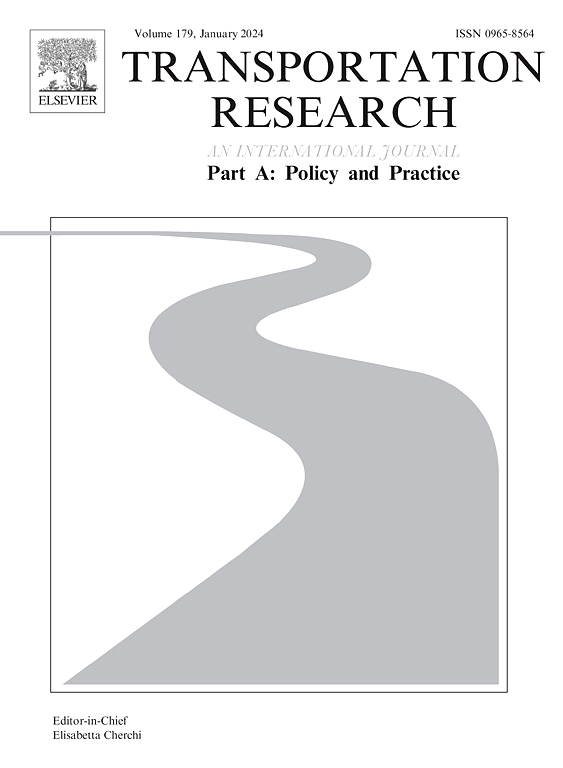A dynamic discrete choice modelling approach for forward-looking travel mode choices
IF 6.3
1区 工程技术
Q1 ECONOMICS
Transportation Research Part A-Policy and Practice
Pub Date : 2024-10-04
DOI:10.1016/j.tra.2024.104272
引用次数: 0
Abstract
In this paper, we present a systematic approach based on dynamic discrete choice models (DDCM) to investigate individuals’ forward-looking mode choice behaviours in daily travel tours with multiple destinations. We propose a novel network transformation model that encompasses the entire decision space of all feasible mode combinations for every observed trip/tour in the dataset. By applying the well-established Recursive Logit model structure commonly used in path choice modelling, we address the tour mode choice problem effectively and quantify forward looking considerations in the mode choice process. The proposed model captures the complex considerations individuals take into account when making mode choices. The network transformation incorporates downstream mode limitations into the preceding mode choice options, enabling us to model individuals’ forward-looking behaviour and gain insights into how considerations of future trips such as a shopping in the evening, or school pick-up trip influence previous mode choice decisions earlier in the day. Uncovering and quantifying these hidden forward-looking factors can help modellers better explain the private car usage usually observed for the entire sequences of daily trips, even in presence of competitive alternative modes. The proposed network transformation also enables us to measure the effect of the requirement/preference to return private vehicles (car, motorcycle, and bicycle) home on mode choices in home-bound trips, and subsequently, on the entire daily mode choice decisions. To validate the proposed model, we utilise the VISTA household travel survey data from the Melbourne Metropolitan area in Australia. The model is compared against baseline models, demonstrating its statistical advantages. Additionally, intuitive illustrations using the data showcase the model’s efficacy. From transport planning and policy perspective, tour-based mode choice modelling provides a more comprehensive and precise understanding of travel behaviour by considering the sequence of trips made by an individual. This can help capture the interactions and dependencies between different trips, which trip-based models may overlook. The proposed model is more suitable for analysing the effects of policy interventions like congestion pricing, public transport investments, or new mobility initiatives, as they can better represent the cascading effects of such policies across multiple trips.
前瞻性出行方式选择的动态离散选择建模方法
在本文中,我们提出了一种基于动态离散选择模型(DDCM)的系统方法,用于研究个人在有多个目的地的日常旅行中的前瞻性模式选择行为。我们提出了一种新颖的网络转换模型,该模型涵盖了数据集中每次观察到的旅行/游览的所有可行模式组合的整个决策空间。通过应用路径选择建模中常用的成熟递归 Logit 模型结构,我们有效地解决了旅游模式选择问题,并量化了模式选择过程中的前瞻性考虑因素。所提出的模型捕捉到了个人在进行模式选择时所考虑的复杂因素。网络转换将下游模式限制纳入了前面的模式选择选项中,使我们能够模拟个人的前瞻性行为,并深入了解对未来旅行(如晚上购物或接送学校)的考虑如何影响一天中早些时候的模式选择决策。发现并量化这些隐藏的前瞻性因素,可以帮助建模者更好地解释在整个日常出行序列中通常观察到的私家车使用情况,即使在存在竞争性替代模式的情况下也是如此。所提出的网络转换还使我们能够衡量私家车(汽车、摩托车和自行车)回家的要求/偏好对回家出行方式选择的影响,以及随后对整个日常出行方式选择决策的影响。为了验证所提出的模型,我们利用了澳大利亚墨尔本大都会地区的 VISTA 家庭出行调查数据。我们将该模型与基线模型进行了比较,证明了其统计优势。此外,利用数据进行的直观说明也展示了该模型的功效。从交通规划和政策的角度来看,基于旅游的模式选择模型通过考虑个人的旅游顺序,提供了对旅游行为更全面、更精确的理解。这有助于捕捉不同出行之间的相互影响和依赖关系,而基于行程的模型可能会忽略这一点。建议的模型更适合分析拥堵定价、公共交通投资或新的交通措施等政策干预的效果,因为它们能更好地体现这些政策在多次出行中的连带效应。
本文章由计算机程序翻译,如有差异,请以英文原文为准。
求助全文
约1分钟内获得全文
求助全文
来源期刊
CiteScore
13.20
自引率
7.80%
发文量
257
审稿时长
9.8 months
期刊介绍:
Transportation Research: Part A contains papers of general interest in all passenger and freight transportation modes: policy analysis, formulation and evaluation; planning; interaction with the political, socioeconomic and physical environment; design, management and evaluation of transportation systems. Topics are approached from any discipline or perspective: economics, engineering, sociology, psychology, etc. Case studies, survey and expository papers are included, as are articles which contribute to unification of the field, or to an understanding of the comparative aspects of different systems. Papers which assess the scope for technological innovation within a social or political framework are also published. The journal is international, and places equal emphasis on the problems of industrialized and non-industrialized regions.
Part A''s aims and scope are complementary to Transportation Research Part B: Methodological, Part C: Emerging Technologies and Part D: Transport and Environment. Part E: Logistics and Transportation Review. Part F: Traffic Psychology and Behaviour. The complete set forms the most cohesive and comprehensive reference of current research in transportation science.

 求助内容:
求助内容: 应助结果提醒方式:
应助结果提醒方式:


